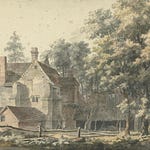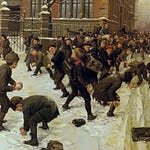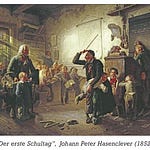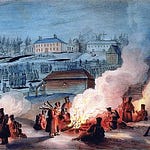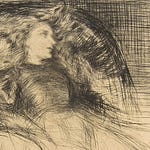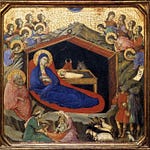“What are you doing?” says the little boy to the man with the long beard, as he lies on the damp ground and the ants start to crawl up his legs.
“Sonny,” says the man, “I’m getting back to NATURE.” And he takes a sip from a can of beer.
Back in the Middle Ages, people thought and wrote a lot about NATURE, but they had no idea that they had run away from it or that you could find it again if you went to the right cornfield or barnyard. Just think: since there were no electric lights, whenever the night was clear, all you had to do was to look up, and there they were, thousands and thousands of stars, and almost nobody in our time ever sees so many.
And think: since there was no great artificial noise, since you never heard trucks rumbling down the road, or the television blaring at you from across the room, you knew about silence, as deep as a well whose bottom you cannot reach, and then in the silence you might hear other living creatures around you – an owl somewhere, or a nighthawk, or the sharp bark of a fox. And it felt like a home, because it was, strange and mysterious but also familiar and near.
Now, people in the west for more than two thousand years have meant more by NATURE than owls and nighthawks and foxes. Sometimes they mean “the way things are.” Then the word tends to grow abstract. “What is the NATURE of the soul?” asks Plato. “What is the NATURE of the electron?” asks the modern theoretical physicist. In each case, we are asking about a thing’s inner BEING. That’s what is suggested by the Greek word PHYSIS, from which we have the word PHYSICS: it describes a manner of being, of existing, and in fact, Greek PHYSIS is a distant cousin of the English verb BE. We use the word NATURE that way in common speech too, when we say something like, “Of course he wasn’t going to tell you the truth if it embarrassed him. That’s his NATURE,” meaning that that’s the way he simply IS.
Last day of our Once in a Blue Moon upgrade and gift subscription special! Click Above for Special Offer Details
And yet,we shouldn’t get to abstract about Nature, either, especially not if we look at the inner meaning of the word. It’s from Latin NATURA, but something happened to that word, something rather like what happened to the English word GNAT: an initial G got absorbed into the N that followed it. Instead of saying G-NAT, we say “NAT,” and instead of saying the old verb GNASCOR, “I AM BORN,” with the G before the N, Latin speakers began to drop the G, and to say NASCOR. So we really are looking for a verb beginning with GN, not with just N. And that’s how we see that NATURA, which comes from that verb, is related to other words that have to do with BEING BORN, with GENERATION: such as Latin GENUS, meaning KIND, and GENERATIO, meaning GENERATION.
The cousins in English will also not begin with N. The Indo-European G became a Germanic C, so we are looking for words that begin with CN, or with C and N and a vowel in between. Of course, I mean the sound that C makes, and not how you spell it. So we have the word KIN, which means that someone shares a relationship with you by birth. We have the Anglo-Saxon word CYNING, which became our word KING, and which named not somebody elected by political means, but the chief of your clan, the head of your KIN. And we have the adjective KIND, which used to mean more than that you are pleasant and gentle. It meant that you were NATURAL, that is, you treated your KIN with the affection they deserved, and you treated your fellow human beings as if they too were a part of your flesh and blood, and not creatures of another species. I mentioned before that when King Lear calls his daughters UNKIND, he is accusing them of being UNNATURAL.
I like that sense that NATURE is what you are born with, and I bristle against experiments against NATURE, such as trying to make boys into girls or girls into boys. Such experiments are not only stupid and bound to fail. They are deeply UNKIND. And sometimes I think that a day or two out in that wide world, without the lights and the sirens, would cure us of the foolishness. Man with the long beard, I don’t half blame you after all.
Word & Song is an online magazine devoted to reclaiming the good, the beautiful, and the true. We publish six essays each week, on words, classic hymn, poems, films, and popular songs, as well a weekly podcast, alternately Poetry Aloud or Anthony Esolen Speaks. To support this project, please join us as a free or paid subscriber.






